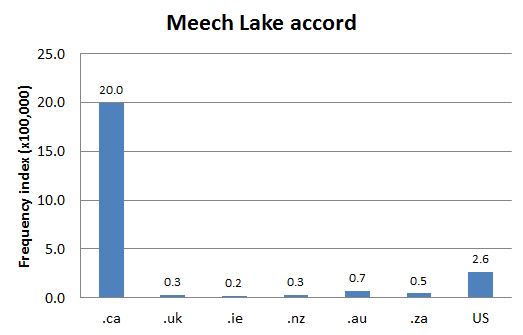DCHP-2
Meech Lake Accord Meech Lake accord DCHP-2 (July 2016)
n. — Politics
a 1987 agreement between the federal government and the provinces to accept a set of demands from Quebec in exchange for Quebec's support of the 1982 Canada Act. The deal lapsed in 1990.
Type: 4. Culturally Significant — The government of Quebec never approved the Canada Act of 1982 (also known as the Constitution Act), which patriated the Canadian constitution. In an attempt to negotiate a deal that would see Quebec support the Act, an agreement was made between the federal government, Quebec and the provincial premiers to bring Quebec into active participation in Confederation by meeting a set of demands laid out by Quebec Premier Robert Bourassa. The most controversial of these demands was the distinct society clause, under which Quebec would be recognized as a distinct society within Canada. Although all premiers agreed to the Meech Lake Accord, named for Meech Lake, Quebec, where the conference was held, it became clear that some provincial governments were uncomfortable with the distinct society clause (see Maple Leaf Web reference).
Famously, Elijah Harper, First Nation's MLA for Rupertsland, Manitoba, refused to give his consent to bypass normal procedural requirements in order for Manitoba to ratify the Accord by the June 23, 1990 deadline. Harper rejected the Accord because First Nations were not adequately consulted in the proceedings (see Canadian Encyclopedia, s.v. "Meech Lake Accord"). Prime Minister Brian Mulroney extended the deadline, but only if Newfoundland, one of the provinces most vocally opposed to the Accord, would ratify first. Newfoundland cancelled a scheduled vote on the Accord, effectively killing the deal (see Maple Leaf Web reference).
The Meech Lake Accord is Canadian in origin, and the failure of the agreement has continuing political and cultural impacts on Canada. When a special committee report proposed amending the Accord to diminish the gains won by Quebec in the initial agreement, then Minister of the Environment Lucien Bouchard, a Quebecker, left the Progressive Conservative party. In light of the failure of the Accord to grant Quebec's demands, he formed the Bloc Québécois, a federal political party whose aim it is to achieve political sovereignty/separatism for Quebec (see Canadian Encyclopedia references and the 2013 quotation).
Elijah Harper's dissension is seen as a pivotal moment in First Nations' political history. His act of dissent, performed as he held an eagle feather in the legislature, has become symbolic of First Nations' asserting an active role in the Canadian political arena (see, e.g. the 1990 and 1996 quotations).
The term is most frequent in Canada (see Chart 1). See also COD-2, s.v. "Meech Lake Accord", which is marked "Cdn".See also: Progressive Conservative Party separatism MLA Parti Québécois patriate Bloc Québécois sovereignty (meaning 1)
References:
- COD-2
- Canadian Encyclopedia s.v. "Bloc Québécois" Accessed 2 Jun. 2016
- Canadian Encyclopedia s.v. "Meech Lake Accord" Accessed 12 Apr. 2016
- Maple Leaf Web "Meech Lake Accord: History & Overview" Accessed 6 Aug. 2013
Images:
Chart 1: Internet Domain Search, 8 Jul. 2013
